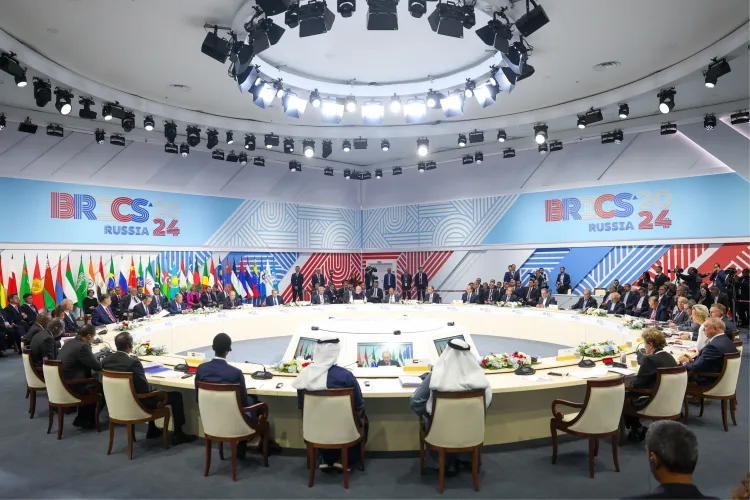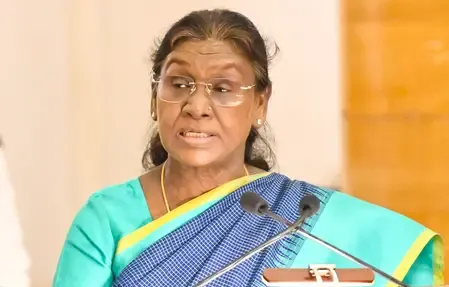How Can BRICS Nations Foster Consensus and Balance Innovation?

Synopsis
Key Takeaways
- BRICS is expanding its influence in global finance and governance.
- AI governance is pivotal for equitable development.
- The dominance of the US dollar is being challenged.
- Climate finance remains a contentious issue with the West.
- BRICS nations are investing in green infrastructure for sustainable growth.
New Delhi: BRICS, which serves as the developing world’s counterpart to the G-7, underwent expansion at the Kazan Summit last year. Following this expansion, Indonesia, Iran, Egypt, Ethiopia, Saudi Arabia, and the UAE have joined the founding members: Brazil, Russia, India, China, and South Africa.
In a world fragmented into silos, BRICS nations are championing pragmatic pluralism. Under Brazil's presidency, there has been a concerted effort to resist the compelling forces pushing BRICS into an anti-Western stance.
Six critical agenda items for the upcoming 2025 Summit in Rio de Janeiro (July 6-7) reflect the prevalent anxieties of our era. These include enhancing the BRICS payment system to stimulate trade and investment; ethical governance of Artificial Intelligence (AI); a climate agenda aimed at recalibrating climate finance politics; strengthened cooperation in public health; global reform of the multilateral peace system; and measures to enhance institutional structure and cohesion.
The prevailing dominance of the US dollar in international markets has spurred the development of an alternative international currency, marking a significant step towards de-dollarization. A report from the International Monetary Fund (IMF) in June 2024 noted a gradual decrease in the dollar's share of foreign reserves held by central banks, with numerous nations diversifying their holdings towards non-traditional currencies and increasing their gold reserves.
The BRICS nations have embraced open innovation dynamics and collective intelligence in their economic and corporate strategies, which include digital currency, mobile payments, car sharing, and delivery platforms. Additionally, innovative logistics solutions are pivotal in managing freight rate fluctuations, a key factor influencing the competitiveness of BRICS economies in global trade.
The unilateral imposition of sanctions or asset freezes by the US is deeply rooted in its monetary hegemony, which is supported by the country's economic, military, and global dominance. The establishment of a BRICS-centric mechanism, be it through a digital currency or an alternative to the Society for Worldwide Interbank Financial Telecommunication (SWIFT), is likely to undermine the dollar's supremacy, drawing the interest of major financial institutions, including the IMF and the US Federal Reserve. Furthermore, the economic and financial sanctions imposed on Russia due to its invasion of Ukraine have escalated geopolitical tensions and economic isolation. The BRICS nations are exploring the establishment of a BRICS basket reserve currency or trading in their own currencies within the BRICS framework.
Governance of Artificial Intelligence is a crucial driver in fostering development and mitigating inequalities through high-tech innovation. The Stanford AI Index Report of 2024 highlighted that over 77% of companies are utilizing AI, and its relevance is growing with the advent of virtual assistants, algorithm-assisted medical diagnoses, and automation in agriculture. Interestingly, India ranks fourth globally in the Stanford HAI's Global AI Vibrancy Tool, trailing only the US, China, and the United Kingdom.
The New Development Bank (NDB) plays an essential role in financing projects that advocate for sustainable development and social inclusion through AI. BRICS nations aim to enhance their collaboration by implementing responsible AI principles centered on human rights, data protection, and information integrity. In this context, UNESCO's Recommendation on the Ethics of Artificial Intelligence from November 2021 provides guidance to governments to ensure AI development aligns with ethical standards without infringing on fundamental freedoms.
BRICS nations must cultivate consensus, balance innovation with social justice, and bolster the digital sovereignty of the Global South, ensuring equitable distribution of AI benefits.
Climate finance remains a contentious issue between BRICS nations and the West. The principles of "common but differentiated responsibility and respective capabilities" outlined in the Convention, Kyoto Protocol, and Paris Agreement advocate for financial support from wealthier parties to assist those that are less endowed and more vulnerable in achieving the objectives of the United Nations Framework Convention on Climate Change (UNFCCC).
The West has consistently failed to meet these obligations, as their populations are accustomed to a high standard of living, making it politically unpopular to ask them to bear the costs for others. Regrettably, the West lacks the necessary political structures and willpower, despite possessing expertise and capacity-building resources. Collectively, BRICS nations represent nearly half of the global population and about one-third of global Gross Domestic Product. The member states are now investing in green infrastructure.
As India's Finance Minister Nirmala Sitharaman emphasized at the 10th Annual Meeting of the NDB's Board of Governors, financing sustainable development in the Global South transcends mere fundraising. It is about fostering fairness, trust, and leadership to enhance cooperation within the Global South for more inclusive and sustainable governance.
"For India, accelerating development is critical to ensuring housing, healthcare, education, and livelihoods for millions. Simultaneously, climate-related challenges such as heatwaves, water scarcity, and extreme weather events are on the rise," stated Sitharaman.
In Rio de Janeiro, amid rising protectionism and a trust deficit, India's digital leadership—including initiatives like Digital India, Digital Public Infrastructure (DPI), and the India AI Mission—will serve as a catalyst for the digital economy transformation of BRICS member states, addressing the developmental needs and aspirations of the Global South.
(The author is an expert on South Asia and Eurasia and previously worked with the Manohar Parrikar Institute for Defence Studies and Analyses. The views expressed are personal.)









